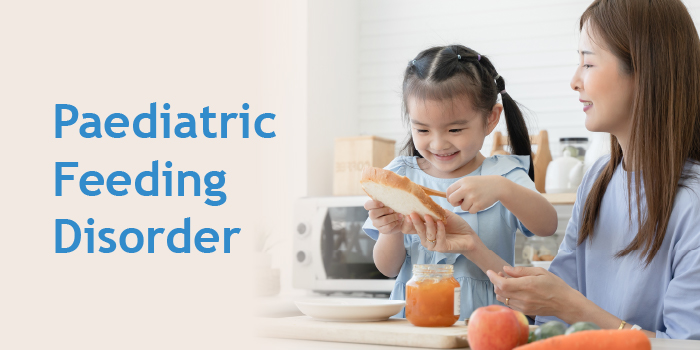|
Paediatric feeding disorder (PFD) is a condition in which a child's oral intake that is not age-appropriate and is likely associated with medical, nutritional, feeding skills and / or psychosocial dysfunction. The relationship between a child's experience with food and their ability to eat it, can be complicating and rarely an easy solution. Some children may have sensory and / or oral-motor difficulties that impact on their ability to safely chew, swallow and enjoy their meal. Parents should seek a team of professionals with specialized skills in paediatric feeding, including Speech Therapist, Occupational Therapist and a Dietician.
Signs you should seek support for your child's eating:
- Coughs during mealtimes
- Gags before or during mealtimes
- Has a gurgly voice after eating or drinking
- Difficulty gaining weight
- Takes a long time to finish meals (i.e. over 30 minutes)
- Refuses a variety of food and textures
- Eats less than 20 foods
- Becomes more particular and restrictive with their food over time
- Becomes very upset around mealtimes (i.e. difficult to sit at the table)
- Difficulty using cutlery
- Difficulty getting food from their plate to their mouth
|
| Events & Promotions |
 |
| Dynamics Therapy Group |
| Satisfied or MONEY BACK GUARANTEED! |
| Book a Risk Free Occupational Therapy or Speech Therapy Assessment... |
|
|
|
| Dynamics Therapy Group |
All Inclusive Package!
10% off on 10 sessions including the assessment fees! |
|
|
|
 |
|
 |
| Dynamics Speech Therapy |
| Speech Therapy Holiday Camps 2022 |
| Come join Dynamics' Speech Camps, that are fun, engaging and will help develop your... |
|
|
|
|
| Dynamics Success Centre |
| Occupational Therapy Camps
|
| Join our school holiday Occupational Therapy camps on Gross Motor Skills, Fine Motor Skill... |
|
|
|
 |
|
| Tips |
| Here are some tips to make family meals enjoyable: |
- Set regular mealtimes. Schedule daily meals and limit snacks between mealtimes.
- Offer family style food. Share a meal together as a family. Use this time to model healthy eating.
- Keep trying. Just because your child refuses the food once, don't give up. Keep offering new foods and those your child didn't like before. It can take as many as 10-15 more times of tasting and touching the food before your child accepts it.

- Encourage kitchen helpers. Some cooking tasks are great for your child to take on, such as stirring, counting ingredients, washing fruits, to name a few. Helping in the kitchen would offer your child more positive opportunities to learn about new foods without the pressure to eat it.
- Avoid bribing your child with treats for eating other food. This can result in frequent daily food battles at the dinner table.
- Avoid rushing. Allow 20-30 minutes for family meals. This gives your child plenty of time to eat and try new foods.
References:
-
Goday PS, Huh SY, Silverman A, Lukens CT, Dodrill P, Cohen SS, Delaney AL, Feuling MB, Noel RJ, Gisel E, Kenzer A, Kessler DB, de Camargo OK, Browne J, Phalen JA. Pediatric feeding disorder: consensus definition and conceptual framework. JPGN 2019;68(1):124-129.
-
Jones, B.L. (2018). Making time for family meals: Parental influences, home eating environments, barriers and protective factors. Physiology & Behavior, 193, 248-251. doi: 10.1016/j.physbeh.2018.03.035.
-
Metcalfe, J.J., Fiese, B.H., & STRONG Kids 1 Research Team (2018). Family food involvement is related to healthier dietary intake in preschool-aged children. Appetite, 126, 195-200. doi: 10.1016/j.appet.2018.03.021.
|
|
| Employee Spotlight |
 |
Nicole Loy
Speech Therapist |
Nicole is a Speech and Language Pathologist who has extensive experience working with children and adult clients with complex communication and swallowing disabilities in Australia and St Lucia. She attained her Masters of Speech Pathology Studies and graduated from the University of Queensland, Australia.
Click here, to get up close and personal with Nicole! |
|
|
|













